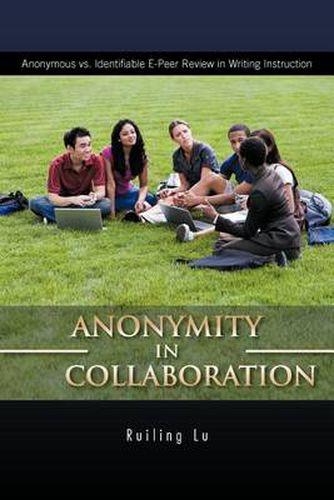Readings Newsletter
Become a Readings Member to make your shopping experience even easier.
Sign in or sign up for free!
You’re not far away from qualifying for FREE standard shipping within Australia
You’ve qualified for FREE standard shipping within Australia
The cart is loading…






This title is printed to order. This book may have been self-published. If so, we cannot guarantee the quality of the content. In the main most books will have gone through the editing process however some may not. We therefore suggest that you be aware of this before ordering this book. If in doubt check either the author or publisher’s details as we are unable to accept any returns unless they are faulty. Please contact us if you have any questions.
This study compared the effects of anonymous e-peer review with identifiable e-peer review on student writing performance and perceived learning satisfaction. It also investigated whether anonymous e-peer review facilitated a greater amount of critical peer feedback. Quasiexperimental design was used to test group differences on the dependent variables. Participants were forty-eight freshmen enrolled in two English composition classes at an American urban university. The two intact classes taught by the same instructor were randomly assigned to the anonymous e-peer review group and the identifiable e-peer review group. The results of the experiment showed that students in the anonymous e-peer review group outperformed their counterparts in the identifiable e-peer review group on writing performance; students in the anonymous e-peer review group provided a greater amount of critical feedback and lower ratings on their peers’ writing. No significant differences between the anonymous e-peer review group and the identifiable e-peer review group were found on student learning satisfaction.
$9.00 standard shipping within Australia
FREE standard shipping within Australia for orders over $100.00
Express & International shipping calculated at checkout
This title is printed to order. This book may have been self-published. If so, we cannot guarantee the quality of the content. In the main most books will have gone through the editing process however some may not. We therefore suggest that you be aware of this before ordering this book. If in doubt check either the author or publisher’s details as we are unable to accept any returns unless they are faulty. Please contact us if you have any questions.
This study compared the effects of anonymous e-peer review with identifiable e-peer review on student writing performance and perceived learning satisfaction. It also investigated whether anonymous e-peer review facilitated a greater amount of critical peer feedback. Quasiexperimental design was used to test group differences on the dependent variables. Participants were forty-eight freshmen enrolled in two English composition classes at an American urban university. The two intact classes taught by the same instructor were randomly assigned to the anonymous e-peer review group and the identifiable e-peer review group. The results of the experiment showed that students in the anonymous e-peer review group outperformed their counterparts in the identifiable e-peer review group on writing performance; students in the anonymous e-peer review group provided a greater amount of critical feedback and lower ratings on their peers’ writing. No significant differences between the anonymous e-peer review group and the identifiable e-peer review group were found on student learning satisfaction.